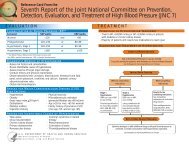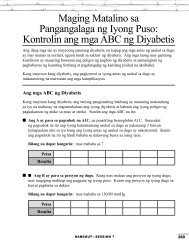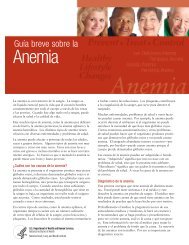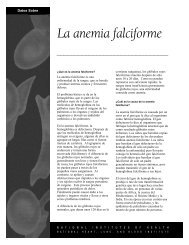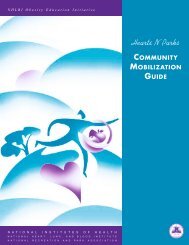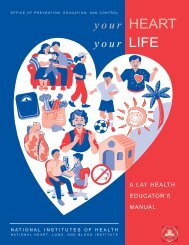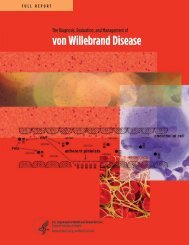WOMEN 'S HEALTH AND MENOPAUSE : - National Heart, Lung ...
WOMEN 'S HEALTH AND MENOPAUSE : - National Heart, Lung ...
WOMEN 'S HEALTH AND MENOPAUSE : - National Heart, Lung ...
Create successful ePaper yourself
Turn your PDF publications into a flip-book with our unique Google optimized e-Paper software.
is alleviated by estrogen treatment. 123,127 In a small<br />
pilot study, ERT ameliorated sleep apnea syndrome<br />
in menopausal women. 128<br />
2.3.7 Recommendations for Other<br />
Neurologic Disorders<br />
Data from observational studies suggest that ERT<br />
does not protect healthy women from the occurrence<br />
of stroke. For epilepsy, migraine, multiple<br />
sclerosis, and Parkinson’s disease, no compelling<br />
data indicate that ERT after menopause has substantial<br />
effects. Sleep disturbances, particularly<br />
during the climacteric and particularly when associated<br />
with hot flushes, may improve with ERT,<br />
although evidence from RCTs is lacking.<br />
3. DISORDERS OF MENTAL <strong>HEALTH</strong><br />
3.1 Mood<br />
Women of all ages have higher rates of depression<br />
than men. 129,130 Geriatric depression is an important<br />
public health concern. 131 Hot flushes and other<br />
menopausal symptoms may affect the quality of a<br />
woman’s life. 132 The menopausal transition does<br />
not appear to represent a time of heightened vulnerability<br />
to affective disorders. 133<br />
A number of antidepressant drugs increase CNS<br />
levels of noradrenaline and serotonin, suggesting<br />
the importance of monoaminergic neurotransmitter<br />
systems in regulating mood. Estrogen influences<br />
noradrenalin and serotonin. Research findings on<br />
women with premenstrual dysphoric disorder or<br />
with major depression beginning in the postpartum<br />
period point toward the importance of sex hormones.<br />
Several short-term studies indicate that ERT given<br />
during the perimenopausal or menopausal period<br />
can diminish anxiety or enhance mood and subjective<br />
sense of well-being. 134–136<br />
Limited data suggest that severe depression in certain<br />
clinical populations is occasionally improved<br />
by ERT. Recent clinical experimental studies of<br />
postpartum depression indicate that reproductive<br />
hormones can be involved in the development of<br />
the disorder 137 and that estrogen can be effective in<br />
a major depressive episode with postpartum<br />
onset. 138 For women with a major depressive disorder,<br />
an older randomized, placebo-controlled trial<br />
of high-dosage estrogen showed significant amelioration<br />
of affective symptoms. 139 Among women<br />
with major depression treated with a selective<br />
SSRI, retrospective analyses do not strongly suggest<br />
important additive effects of concomitant<br />
ERT. 140,141<br />
Older postmenopausal women who use estrogen<br />
typically report fewer depressive symptoms than<br />
nonusers. 142 In RCTs in postmenopausal women<br />
without a diagnosis of depression, ERT has been<br />
reported to reduce scores on measures of depressive<br />
symptoms 134–136 and to have no effect on<br />
mood. 42,43 Apparent beneficial effects of estrogen<br />
on mood may be diminished by the concomitant<br />
administration of a progestin. 143<br />
3.2 Schizophrenia<br />
Schizophrenia is a chronic<br />
psychotic disorder<br />
characterized by delusions,<br />
auditory hallucinations,<br />
disorganized<br />
thought processes, affective<br />
blunting, and difficulty<br />
in sustaining<br />
goal-directed activity. Frequency does not significantly<br />
vary according to sex. Symptoms typically<br />
appear in the third decade of life, but onset occurs<br />
on average 3–5 years later for women than<br />
men. 144,145 Late-onset schizophrenia is more common<br />
in women, 146 although menopause does not<br />
appear to heighten risk. 145 Estrogen effects on<br />
dopaminergic or serotonergic systems of the brain<br />
could influence schizophrenic symptoms. Among<br />
ovulating women, a higher serum estrogen<br />
concentration has been associated with milder<br />
psychopathology. 147 Data from observational<br />
studies suggest that<br />
menopause is associated<br />
with increased sleep<br />
disturbances.<br />
In a small, open-label trial in<br />
women with schizophrenia, estrogen added to<br />
259



